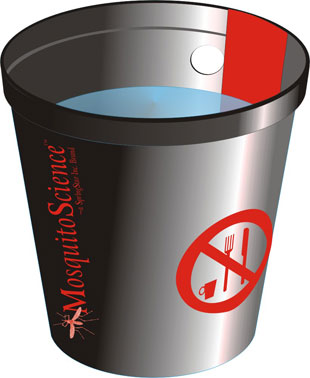Army Laboratories Work Together to Defeat Dengue

WRAIR and USAPHC mosquito trap technology receives national award
With Florida's dengue outbreak last year, Key West residents became the beneficiaries of a mosquito trap technology first developed by Army laboratories nearly a decade ago and recently transferred to private industry for commercial use and distribution worldwide.
The World Health Organization considers dengue one of the most serious mosquito-borne viral diseases, with approximately 20 million cases a year and 100 countries affected. Dengue is a threat to deployed troops, as well as residents, of tropical and subtropical climates. A vaccine is not yet available, so mosquito control remains critical to prevention. There are reports that conventional ground and aerial application of insecticides are not adequately controlling the mosquitoes that transmit dengue. Dengue is primarily transmitted by the Aedes aegypti species of mosquito, which is a container breeder, meaning the female will only lay eggs in a container holding water.
U.S. military research scientists Michael Perich of the Walter Reed Army Institute of Research (WRAIR) and Brian Zeichner of the U.S. Army Center for Health Promotion and Preventive Medicine, now called the U.S. Army Public Health Command (USAPHC), believed they could use the "female mosquito's irrepressible urge to oviposit" to develop a trap with advantages over conventional methods of controlling the population of container-breeding mosquitoes.
The result was the Lethal Mosquito Breeding Container, a pint-sized cup with water and a strip treated with a small amount of pesticide. By killing adult female container-breeding mosquitoes and their mosquito larvae, the population of biting mosquitoes is substantially reduced, thus decreasing both the potential for disease transmission and the breeding stock for the next generation. This approach is superior to only trapping and removing eggs laid by female container-breeding mosquitoes, which just go on to lay additional eggs in a natural site that allows complete development of the larvae to adults.
Protected by several patents, the technology was field tested at WRAIR, with results of up to 100 percent adult mosquito mortality.
Under a Cooperative Research and Development Agreement between USAPHC and SpringStar, Inc., Zeichner worked with the small, U.S.-based pest control company to design a commercial version of the lethal ovitrap fit for mass production. The Office of Research and Technology Applications at the U.S. Army Medical Research and Materiel Command then negotiated an exclusive, worldwide license between USAPHC, WRAIR and SpringStar.
After Florida's dengue outbreak, the state issued an emergency-use permit, and Zeichner traveled with SpringStar employees to Key West to distribute lethal ovitraps to area residents. They joined efforts with the Florida Keys Mosquito Control District (FKMCD), Armed Forces Pest Management Board, U.S. Department of Agriculture/Agricultural Research Service, and Key West Naval Air Station.
In January 2011, the Lethal Mosquito Breeding Container was selected as a winner of the Federal Laboratory Consortium (FLC) 2011 Award for Excellence in Technology Transfer. Inventors Zeichner and Perich (who died in 2003) will be recognized at an award ceremony on May 5, 2011, at the FLC National Meeting in Nashville, Tenn.
The Award for Excellence in Technology Transfer is presented annually by the FLC, recognizing laboratory employees for outstanding work in transferring a technology developed by a federal laboratory to the commercial marketplace. A distinguished panel of technology transfer experts from industry, state and local governments, academia, and the federal laboratory system evaluated the nominations. Since its inception in 1984, the FLC award has become one of the most coveted honors in the technology transfer field, with nearly 200 federal laboratories honored for their work in projects that advance the mission of technology transfer.
 An official website of the United States government
An official website of the United States government
 ) or https:// means you've safely connected to the .mil website. Share sensitive information only on official, secure websites.
) or https:// means you've safely connected to the .mil website. Share sensitive information only on official, secure websites.




